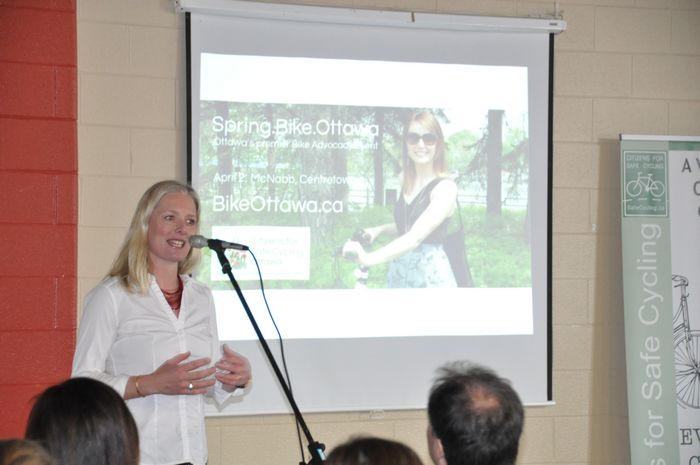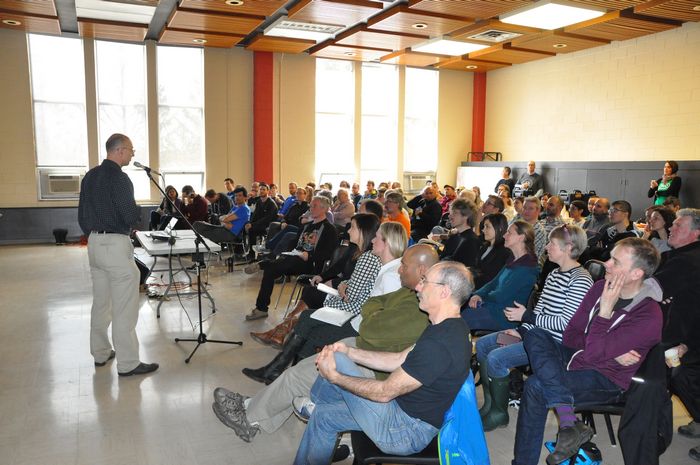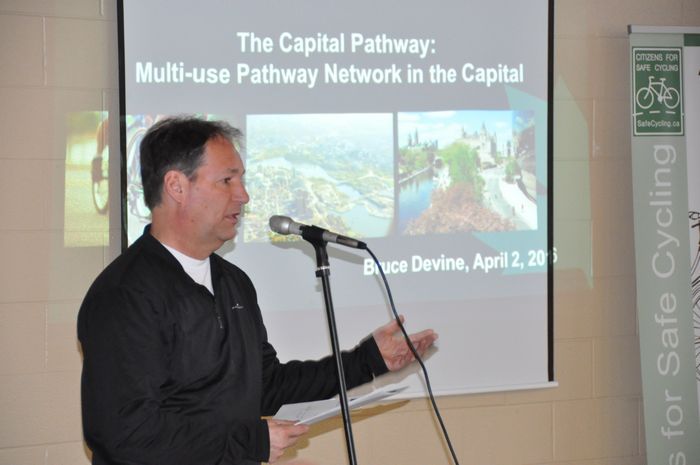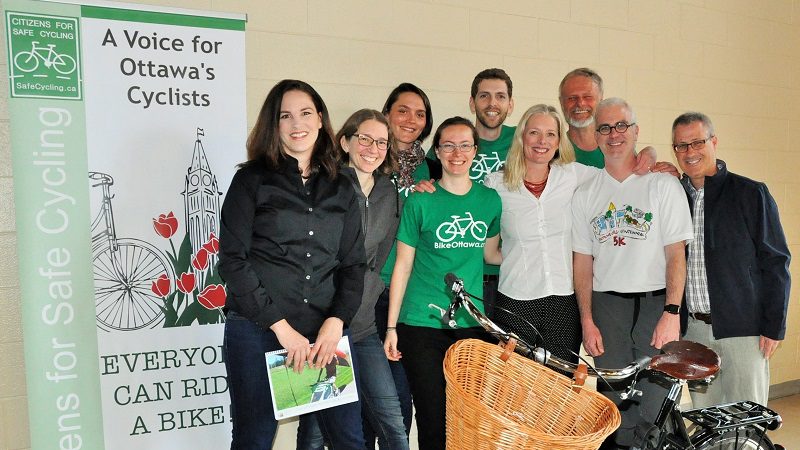This year, to avoid stealing the Easter bunny’s thunder we kicked off spring a week later than usual on April 2nd, the second Saturday of the season.
Our Spring.Bike.Ottawa event was more popular than ever with 100+ community members out to hear from an impressive line-up of speakers, watch a Canadian premiere video screening, and mingle with fellow cyclists from around the city.
CfSC was honoured to have Catherine McKenna–wearing two hats as both Minister of Environment and Climate Change and Ottawa Centre Member of Parliament –join us to kick off the event with opening remarks.

Kornel Musci from the City of Ottawa‘s transportation department got the crowd thinking about possibilities for cyclist-friendly intersection design, drawing inspiration from Dutch models. There is space to consider protected intersections at most intersections in Ottawa, and they work for both single and bi-directional bike lanes. “Let’s learn from other places and come up with better standards,” said Musci.

Next up, Kate Whitfield (Parsons) shared learning from the Winter Bike Congress in Minnesota this past February. For example, residents of Minneapolis are assured that their bike routes will be plowed by 7am each day, in time for the morning commute. Meanwhile, Ottawa has started maintaining a larger winter cycling network this year with specific standards based on recommendations in the Ottawa Cycling Plan (2013). It’s a four-year plan, Kate noted, so we should keep up the advocacy work to make sure these standards are maintained beyond that period. Link to Kate’s presentation
Before a break for snacks and mingling, CfSC Board member Heather Shearer introduced our 2016 Annual Report on Cycling in Ottawa. The report includes updates on new infrastructure over the past year, reviews progress and makes recommendations for enabling safer cycling in Ottawa, profiles of some CfSC members and highlights of data on cycling in the city. You can now read the full report online and learn more interesting facts like the one below.
Learned this afternoon at @BikeOttawa spring bike event: Ottawa is third fastest growing cyclist population in the world. #really
— Centretown Buzz (@centretownbuzz) April 2, 2016
After the break CfSC’s former President Hans Moor introduced the Canadian premiere screening of the mini-documentary Mama Agatha, a film by Fadi Hindash. The film follows a group learning to ride bikes from Mama Agatha, a 59-year-old Ghanaian woman who runs a bicycle training program for migrant and refugee women in the south of Amsterdam. Greg Searle fittingly followed the documentary by highlighting Wheels for Refugees‘ work setting up Syrian refugees with bikes and safe cycling skills in Ottawa.
The NCC’s Bruce Devine brought us back to questions of infrastructure in Ottawa with updates on NCC multi-use pathway network in the capital region. Growth in the number of users and frequency of use of these pathways have led the NCC to consider new plans for sections of the pathways. These plans include segregation of cyclists and pedestrians on some parts of the network.

CfSC Board Member Felicity Borgal presented results of her recent research on Ottawa cyclists, who according to her results, are not the stereotype you may have in mind. Furthermore, she highlighted that a”bikes versus cars” mentality doesnt hold well considering that most of her survey respondents were both cyclists and drivers. Check out more results in her presentation below.
Cycling research presentation by Felicity Borgal
Our final speaker, Laurie Tucker (Burn Tucker Lachaîne Injury Lawyers) brought us some very important information about some of our legal rights as cyclists–and particularly what to do if you’re in a collision. It’s not a possibility anyone likes to think about, but being well-informed of your options and responsibilities in the event of a crash is very important. Should you ever be in this situation, Laurie highlighted the importance of gathering as much information as possible immediately following the incident, particularly contact information of all involved and any witnesses. From there, make decisions about whether to report the crash to police or insurers. An injury lawyer should provide a free no-obligation consultation about what other steps you could take. There are a lot of complexities around timelines for starting claims (as short as 10 days!), insurance, and what can be eligible to be reimbursed. Income-replacement is something else worth thinking about ahead of time – you might not be eligible for as much as you might think. The insurance and liability situation is not as straightforward for a cyclist-motorist crash (or a cyclist-bad infrastructure crash) as it would be for a more typical motorist-motorist crash. As well, people in this region face the issue of a provincial border: it matters which province each party lives in and where the crash happened.
This practical advice brought Spring.Bike.Ottawa 2016 to a close. CfSC thanks all those who came out, including 18 new members and lots of other familiar faces of all ages. Thanks also to the organizations who came out to show their support and represent their like-minded initiatives, including Healthy Transportation Coalition and Safe Streets Ottawa. See you next year!

